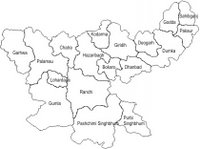Thursday, November 30, 2006
Indian Patent Filings Expected to Increase by 23%
Wednesday, November 29, 2006
Torrent Pharmaceuticals received a U.S. Patent for novel heterocyclic compounds


Mylan Continue Firing Legal Canons!
Friday, November 24, 2006
Jharkhand Government Seeks Patent Power
 Jharakhand, one of the largest silk producing states in India, is likely to seek patent protection for the variety of organic silk to give a boost to the state economy. The Sericulture and Handicraft Department has approached the Central Silk Board (CSB) to work towards getting the organic silk patented.
Jharakhand, one of the largest silk producing states in India, is likely to seek patent protection for the variety of organic silk to give a boost to the state economy. The Sericulture and Handicraft Department has approached the Central Silk Board (CSB) to work towards getting the organic silk patented. Thursday, November 23, 2006
Patent iNSIGHT Pro
AIPS to Launch New Session for Diploma in Patent Management from January 07
 Mumbai-based Patent training institute --- Academy of Intellectual Property Studies will be inaugurating its new batch for One-year Part-time Post Graduate Diploma in Patent Management from January 20, 2007. The diploma is an in-depth programme providing a specialization in Patents. Both the theory and practice elements are addressed, and areas such as Patent Fundamentals, the Indian Patent Act, International Treaties relating to Patents, Prior Art Search, Specification Drafting, Opposition procedures, PCT filing, Pharma patenting, Polymorphism, Patent litigation, Patent Strategy and Management, etc are some of the topics covered.
For complete details regarding course contents, faculty, methodology etc. visit www.aips.ac.in or email AIPS at info@aips.ac.in or call +91 22 6522 1067/2650 9035.
Mumbai-based Patent training institute --- Academy of Intellectual Property Studies will be inaugurating its new batch for One-year Part-time Post Graduate Diploma in Patent Management from January 20, 2007. The diploma is an in-depth programme providing a specialization in Patents. Both the theory and practice elements are addressed, and areas such as Patent Fundamentals, the Indian Patent Act, International Treaties relating to Patents, Prior Art Search, Specification Drafting, Opposition procedures, PCT filing, Pharma patenting, Polymorphism, Patent litigation, Patent Strategy and Management, etc are some of the topics covered.
For complete details regarding course contents, faculty, methodology etc. visit www.aips.ac.in or email AIPS at info@aips.ac.in or call +91 22 6522 1067/2650 9035.Wednesday, November 22, 2006
Upcoming Events
Teva Settled Patent Dispute with Pfizer
Tuesday, November 21, 2006
Riluzole Patent Litigation Still Open for Impax Laboratories
Mr. USFDA: It’s Time to Revise Homework!
Saturday, November 18, 2006
Novo Nordisk sues USPTO
Friday, November 17, 2006
Patent Circle Recommends – TTABlog and Daily Dose of IP
Upcoming Events
Mayne Pharma Loses Patent Litigation to AstraZeneca
Wednesday, November 15, 2006
Cobalt follows DRL and Spectrum
Tuesday, November 14, 2006
After DRL, its Spectrum to Settle Imitrex Patent Dispute with Glaxo
Monday, November 13, 2006
Andrx Sued for Infringement of Adderall XR Patents
Thursday, November 09, 2006
India & Malaysia to Start IPR Institute
Generics Ready to Hit U.S. Zofran Market!
Cephalon received U.S. Patent for Armodafinil Polymorphic Form
 U.S. Patent & Trademark Office has issued U.S. Patent # 7,132,570 (the ‘570 patent) against the patent application number 10/539,918 filed by Cephalon France for polymorphic form of laevorotatory enantiomer of modafinil or armodafinil, the active ingredient in NUVIGIL tablets which is pending for approval with the US Food and Drug Administration. The ‘570 patent will run out its patent term on December 18, 2023. NUVIGIL is improved version of Cephalon’s blockbuster drug PROVIGIL.
U.S. Patent & Trademark Office has issued U.S. Patent # 7,132,570 (the ‘570 patent) against the patent application number 10/539,918 filed by Cephalon France for polymorphic form of laevorotatory enantiomer of modafinil or armodafinil, the active ingredient in NUVIGIL tablets which is pending for approval with the US Food and Drug Administration. The ‘570 patent will run out its patent term on December 18, 2023. NUVIGIL is improved version of Cephalon’s blockbuster drug PROVIGIL.
Wednesday, November 08, 2006
Palomar & Cynosure Entered into Cross Licensing Agreement
District Court Sets a Hearing Date in Diomed Patent Litigation

Tuesday, November 07, 2006
Terbinafine: The Next Blockbuster to Go Off-patent

Fulvestrant Expiring in December 2007, not October 2006
Thursday, November 02, 2006
What Glaxo Want?
Forgent Settles JPEG Patent Battle
Wednesday, November 01, 2006
Apotex Asks Federal Circuit to Lift Ban
Apotex Inc. has asked a federal appeals court to lift a ban on sales of generic versions of the blood-thinning drug Plavix in the US. Apotex attorney told the U.S. Court of Appeals for the Federal Circuit that a ban imposed by a judge should be overturned because the patent is invalid and because Sanofi-Aventis and Bristol-Myers could be reimbursed anyway if they win at trial in January, 2007. Apotex further added that the key ingredient in Plavix, clopidogrel bisulphate, is covered by a patent that has already expired and the 2011 patent is invalid because it’s an obvious variation on the earlier patent. In response, Sanofi attorney argued that Apotex was “making an after-the-fact, hindsight argument.” He argued that after years of testing various chemical compounds, Sanofi researchers produced “dramatically different” results that expected. He further added why his clients would “spend seven years and millions of dollars” if clopidogrel bisulfate is “obvious.”